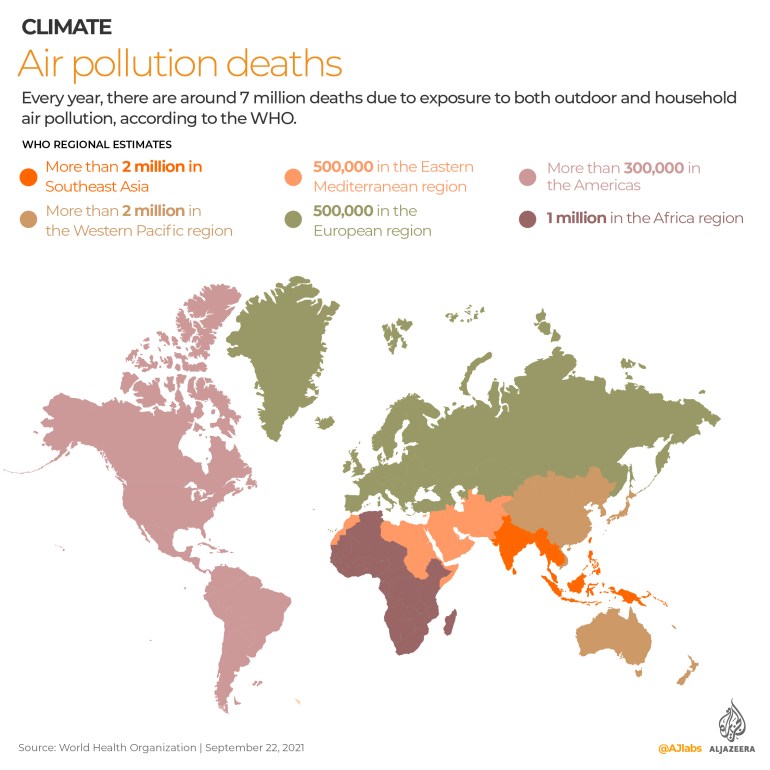Thu 23 September 2021:
The World Health Organization (WHO) has tightened its air quality guidelines for the first time since 2005, warning that air pollution is one of the biggest environmental threats to human health, causing seven million premature deaths a year.
The United Nations health agency said on Wednesday that urgent action was needed to reduce exposure to air pollution, ranking its burden of disease “on a par with other major global health risks such as unhealthy diet and tobacco smoking”.

The new guidelines aim to protect people from the adverse effects of air pollution and are used by governments as a reference for legally binding standards.
The WHO last updated the guidelines in 2005, which had a significant impact on policies to clean up the world’s air.
But the UN health agency said that in the 16 years since, a much stronger body of evidence had emerged, showing how air pollution affects health at lower concentrations than previously understood.
“The accumulated evidence is sufficient to justify actions to reduce population exposure to key air pollutants, not only in particular countries or regions but on a global scale,” the organisation said.
Greenpeace noted that many major cities around the world were already in breach of the 2005 guidelines and said more meaningful action was urgently required.

Asia worst hit
The WHO’s new guidelines include recommendations for air quality levels for six pollutants, including ozone, nitrogen dioxide, sulphur dioxide and carbon monoxide.
The other two are PM10 and PM2.5 – particulate matter equal or smaller than 10 and 2.5 microns in diameter.
In response, the PM2.5 guideline level has been halved.
In 2019, more than 90 percent of the world’s population lived in areas where concentrations exceeded the 2005 AQG for long-term PM2.5 exposure, according to the WHO.

Among the cities with the dirtiest air were Delhi (PM2.5 exceeded 17-fold), Lahore (16-fold), Dhaka (15-fold), and Zhengzhou (10-fold)
It noted that in eight of the world’s 10 biggest cities no PM2.5 data was available.
The new guidelines come just weeks before the COP26 global climate gets underway in the Scottish city of Glasgow on October 31.
The WHO said that alongside climate change, air pollution was one of the major environmental threats to human health. Improving air quality would enhance climate change mitigation efforts, and vice versa, it added.
“Air pollution is a threat to health in all countries, but it hits people in low- and middle-income countries the hardest,” said WHO chief Tedros Adhanom Ghebreyesus.
“Every year, exposure to air pollution is estimated to cause seven million premature deaths and result in the loss of millions more healthy years of life,” the WHO said.

In children, this could include reduced lung growth and function, respiratory infections and aggravated asthma.
In adults, coronary heart disease – and stroke are the most common causes of premature death attributable to outdoor air pollution.
Evidence is also emerging of other effects such as diabetes and neurodegenerative conditions, the organisation said.
_____________________________________________________________________________
FOLLOW INDEPENDENT PRESS:
TWITTER (CLICK HERE)
https://twitter.com/IpIndependent
FACEBOOK (CLICK HERE)
https://web.facebook.com/ipindependent
Think your friends would be interested? Share this story!





